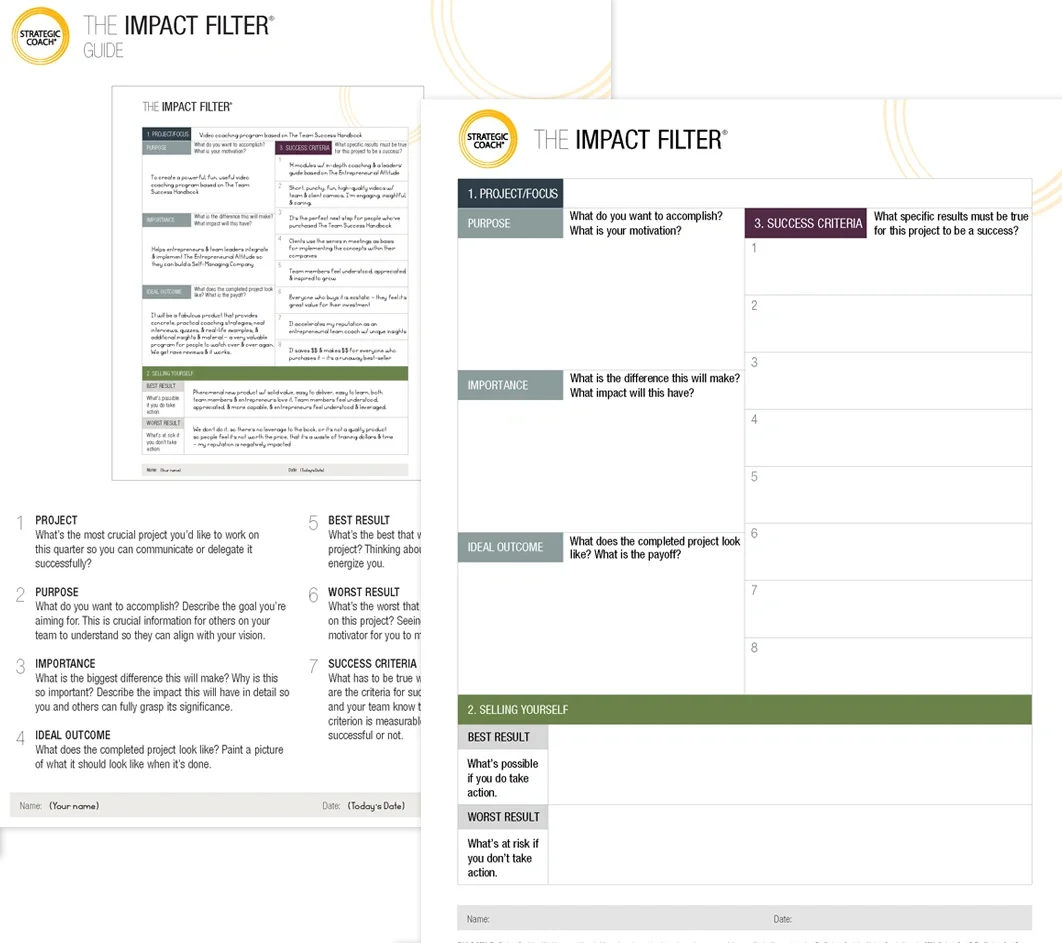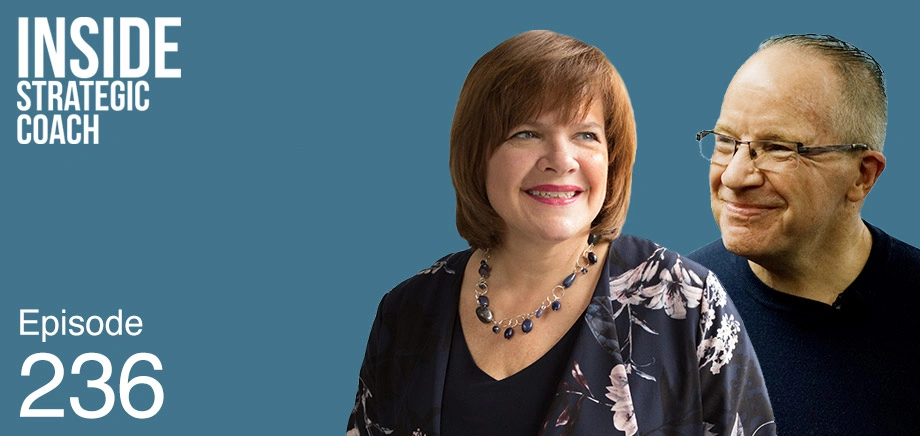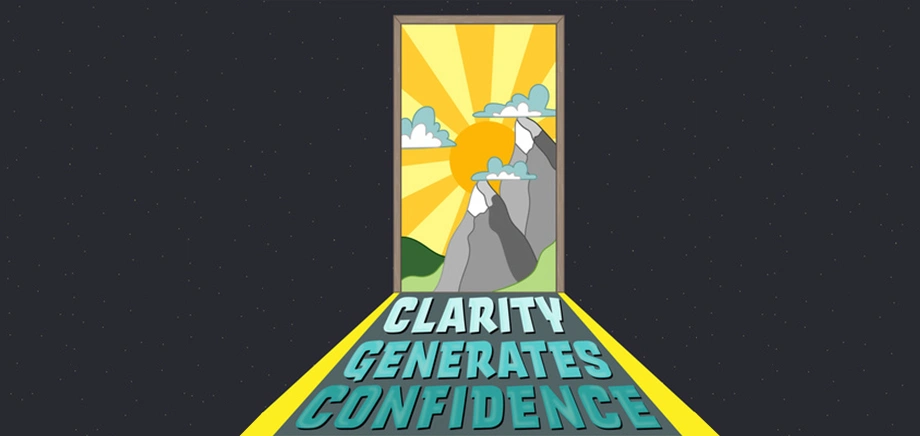Business Success Starts With Context Over Content
August 05, 2025
Hosted By
 Dan Sullivan
Dan Sullivan
 Shannon Waller
Shannon Waller
Worried about competitors copying your ideas? Dan Sullivan reveals why context—not just content—makes your thinking truly unique. Learn how The 10x Mind Expander® tool helps entrepreneurs reframe their past successes as springboards for growth, why AI is creating exciting new contexts for creativity, and how to protect your best ideas while staying ahead of the curve.
Here’s some of what you’ll learn in this episode:
- How adding context helps you understand yourself as an achieving entrepreneur.
- Why stealing content won’t work for you.
- The best way for creative thinkers to partner with AI.
- Simple ways to add valuable context to content.
Show Notes:
For 36 years, Strategic Coach® has delivered new thinking tools every quarter.
AI isn’t just a tool—it’s a game-changing context for how we create and communicate.
A 10x revenue goal feels impossible until you realize that you’ve already done it before.
Past growth holds the clues—look back to see how you’ve already achieved 10x jumps.
To grow 10x again, simplify. Keep what works and focus on the few key changes needed.
You likely have 50% of what you need for your next 10x leap—your experience proves it.
Entrepreneurs accumulate a lot of content (experiences, data) without necessarily knowing what it means.
Context transforms content—it’s the difference between “what happened” and “why it matters.”
Strategic Coach thinking tools give brand new context to content, helping entrepreneurs reframe their past to unlock their future potential.
Recognizing how you made a previous jump allows you to see content differently.
You have to be willing to go through fear, uncertainty, and discomfort to get to a new level of normal.
Content can be stolen, but it falls flat without context around it.
Resources:
The 10x Mind Expander by Dan Sullivan
Episode Transcript
Shannon Waller: Hi, Shannon Waller here, and welcome to Inside Strategic Coach with Dan Sullivan. Dan, you are Mr. Context. It is very much how you create tools and create thinking exercises for our clientele. And you had a great comment the other day. You said, you can steal content. It's really not as easy to steal context. And I was like, ooh, cannot wait to talk about that. So what is the difference between content and context? And why is content more stealable than context? I'm curious.
Dan Sullivan: This really deals with the issue of whether the work that you're doing as an entrepreneur is actually new and original, or is it repetitive and you're just borrowing from other people, okay? And this becomes a big issue in the entrepreneurial world because of the concept of intellectual property. So intellectual property is an idea that is new and deemed to be useful in a way that no previous idea has been as good. We've been, I think, very, very fortunate because in Strategic Coach we've been creating new content now every quarter for going on 36 years. Every quarter there's brand new ideas in the Program, new thinking tools.
So we have a structure where we challenge entrepreneurs to remember how they had a certain success in a certain part of their entrepreneurial life and we get them to actually inventory this, actually create a list. This is where you're successful, this is where you're successful. I think the tool that we have in Strategic Coach called the 10x Mind Expander, it really gets right to the essence of what we're talking here. So in a Strategic Coach Program, we'll say, what's the best you've done so far? And for entrepreneurs, one good score to keep track of how you're doing better is, what are your revenues? In the UK, that's called turnover.
I said, okay, this is the best that you've done right now, this best year you ever had. I'll say, now I'd like you to take that number and multiply it by 10. And you can see there's this shock, you know, because instantly they know what it took to get to where they are, and now 10x really, really becomes a challenge to them. Okay, so what they've done up until now is content. When you bring in the issue of 10x, now you've introduced context. You've created an entirely new context to understand you as an achieving entrepreneur. And that 10x immediately changes the meaning of everything you've done up until now. And there's a general freak out.
Shannon Waller: I call it the 10x mind bender.
Dan Sullivan: Yeah, and there's a freak out. And I said, I'm not saying you're going to do this. I'm just saying, if your goal was now 10x what you've achieved in the past, what does that do to your brain? What's that do to your thinking? And all of a sudden, their whole world changes just by asking them that one question. Well, you've changed the context. They thought that they were at the top of their game. And in a certain sense, you've told them, let's create a new bottom. And the new bottom is everything you've achieved up till now. Well, you've just changed the entire meaning of everything they've done. And they were looking at their achievement in this particular fashion, but with just the asking of a question, you've totally shifted the context.
So that's the difference. And then what we have is a really interesting next step, and that is we say, okay, to get a handle on this, let's go back to where you were when you were one-tenth of where you are right now, okay? So they go back, and let's say they're at 10 million, their company is 10 million, and you take them back to when they were 1 million. Then you get them to write the history of how they went from 1 million to 10 million, okay? Well, they now have a completely different context for looking at their past. They thought that they were, you know, world beaters by going from 1 million to 10 million, but you said, no, but let's go back and look at how you got there.
First of all, when you were 1 million, did you know how you were going to get to 10 million? And the answer is no, they didn't. And I said, so when was it? And say it was 20 years. And I said, so just arbitrarily, let's break that journey from one million to 10 million into five jumps that you took, okay? And actually put the calendar, what were the five significant things that got you here from one million to 10 million? And they got all the answers in their head. They said, well, I met this person. And what they discover, and filling in the five jumps that they took, you can ask them, what were your revenues then? How big a team did you have? Who are the key clients or customers that you had, and everything else.
And all of a sudden, their entire past gets totally transformed. They have a totally different notion of who they are and how they did what they did. But interestingly enough, all the evidence they use for this is content. But it was the same content they already had. They just weren't seeing that their past suddenly becomes very, very different. And they come up, and I said, well, was one of the challenges of asking you about how you'd go 10x more, was it that you didn't think you had the experience of going 10x? You've just proven to yourself that you have the experience of going 10x, and not only that, you know how you did 10x. And how many of you, knowing how you did it the last time, could do it again? How many of you know 50% right off the bat of how you would get to 10x if that was your goal?
They nod, and then you say, well, you know as much about how to go 10x next time as you did at the beginning. Namely, you didn't know how you were going to do it. So what more new things do I have to learn? Does my role have to change to go 10x? And the answer is yes. They have to get a lot simpler because to get to 10 million, they did this and this and this. And I said, so what are the things that you would just keep doing that got you here so far? So they begin to identify that they probably have half of what they need to go another 10x, just based on their experience and their achievements. So the big thing is, the content is the content. You did this, you did this, that's the content. But they're seeing what they did up until now totally different Now then, before you ask them, how would you go 10x higher?
Shannon Waller: This is really impactful, Dan, because this is what you do. Entrepreneurs collect a lot of experiences.
Dan Sullivan: Content.
Shannon Waller: They collect a lot of content, and they don't know what it means. So context is giving meaning to content, and what is so incredibly valuable about the Program is with all of your exercises, the ones that you create and the ones that a few others do as well, It provides brand new context to their experience and all their content. So that great definition of Strategic Coach right there. And then also when you help say, what do you need to keep doing? You're actually telling them or asking them to identify what's going to stay the same. So not everything is gonna change. That's the other thing that has people's eyes go really wide is like, oh my gosh, do I have to change everything?
And the answer is no. Your Unique Ability activities, certain key team members, those are gonna stay the same. Certain activities you do are gonna stay the same. And then one other fun—we just actually recorded a podcast on fear. And one of the things that I didn't bring in for that one, but it's also true, is every time you go to that next jump, what you did before and what you are gonna do in the future, involves being willing to experience fear, uncertainty, and discomfort to get to a new level of normal. So, this is a normal, natural part of entrepreneurial growth, which ties exactly into what we were just talking about.
So, this is fascinating. And Dan, people do get so stressed about people stealing their ideas. But when you provide context, it's like someone could take a name, a tool, a something, but if they don't understand the actual context around it, it falls flat. It doesn't actually work. And you've had experience with this, unfortunately. So say why content doesn't actually work without context, because that's my experience of it.
Dan Sullivan: Yeah, well, I think the meaning of any content really comes from the context in which it's being experienced. Okay. Say one thing that's happening in the world right now where you can see a profound shift that I think is going to affect everybody, and it's the introduction of artificial intelligence. You know, we're into our third year since ChatGPT came out, OpenAI. And I've noticed in myself, so I'll just start off with my own experience of this, is that I've got sort of a thinking partner with AI. And I'm not someone who is using 25 different AI tools. I'm using one tool. I'll put out a commercial plug here. It's Perplexity. And I love Perplexity because it's kind of congenial. I get a feeling that this AI really wants to be useful to me.
So I'll create a paragraph. It's my input, so I'll put together a paragraph. And I just did it yesterday, so we started off this new book, Always More Ambitious. Okay, so I wrote up about a hundred-word paragraph. And then I went to Perplexity, I cut and paste, and I put the paragraph in. And I said, now, I want to rewrite this paragraph. I want to write it in the concise, factual, practical, axiomatic style of Strategic Coach Dan Sullivan. And immediately, Perplexity goes to the entire internet, and it pulls in what Dan Sullivan sounds like. And I said, But I want to deliver it in a tone that's very friendly, very inviting, playful, humorous, encouraging, and supportive. And out comes this paragraph, 100 words, and it follows the rules. And all of a sudden, the entire content has changed simply because I gave it this context.
Shannon Waller: And it's even more Dan than Dan.
Dan Sullivan: Yeah, then I say, now here's the thing. I want 50% of the sentences in the second person singular, you voice, okay? Not every sentence. And I'd like to have short, medium, and long sentences. One of them a complex sentence with three clauses, okay? And ch-ch-ch, you have it. So, what I want to say here is that having this tool, I'm a writer, I've been writing for a living since I was 30 years old, so I've had 50 years of writing, but this tool, having this available tool now changes the total context of what my writing can be right now and what my writing is going to be in the future. And every week I come up with a new trick, you know, to make it sound more and more like me, okay?
So, I'll do that, and then I take the hundred-word paragraph that's the introduction, and I say, now I'd like to rewrite this paragraph from a totally oppositional perspective, arguing that ambition is actually a bad thing, and it's the reason for all the misery and inequality on the planet and how it drives the person who is ambitious crazy. 100 words, comes out same style and everything. And then I take those two paragraphs and I go back and I start doing original thinking again and I said, okay, I'm going to make five sub-paragraphs out of this and this is the first one and I write it and I write it and I write it. I go through all five of them, and then I take it and I put it back into Perplexity, and I say, now, make this all sound like the prompt that I gave before, okay? And they all come out.
And I've always seen there's a part of writing that's a really lonely business, and at 80, I've found out that I've got a partner, and so I can write a lot more, I can write a lot more quickly, I can write a lot more easily going in the future. And at 80, to know that your best, easiest, fastest writing days are ahead of you changes the context of my life.
Shannon Waller: That is a fabulous example, Dan. Oh my gosh, so many thoughts. So, it does provide a new context, and it's because it's this incredible new capability. And as you said, writing can be very lonely and very isolating, and when you've got someone, something, that can make an even better version of you. And the cool thing is, you can even say, based on this, ask me five questions, or ask me to help expand your own thinking. So, it really is like a buddy. So, the context, in this case, I would say it's a capability, is profoundly impactful to your sense of what's possible in the future. Yeah, like there's a couple books I'm working on right now, and there's no way, well I have a short deadline I need to get going on it, but there's no way I could even hope to do it unless I also took advantage of this. So that's, yeah.
Dan Sullivan: Yes, so I'm saying that for myself, but the whole world has just changed, so humans who are creative and humans who do have original thoughts have a great new communication power that they didn't have before, if they want to take advantage of it. And that changes everything. If you thought there was a lot of writing out in the world before this, you ain't seen nothing yet, you know, and everything like that. But the big thing is to understand that the input has to be original on your part. It won't create original thoughts.
Shannon Waller: No, in fact, it's really, really boring if you don't do it that way. It's interesting because a lot of people wouldn't necessarily think of technology as being part of context. Does that make sense? But how you use it, I was reflecting back on our book, You Are Not a Computer. You can either dumb you down if you let it do all your thinking, or you can use it as this incredible partner to help you do even better thinking and expand your own context and your own original thought, which is what I'm hearing you say.
Dan Sullivan: Mm-hmm.
Shannon Waller: Mm-hmm.
Dan Sullivan: So, for all humans right now, AI is a completely new context. There's a lot of people who are basically talkers, that basically they don't like writing. So they've created their program in such a way that they have a conversational partner. So who you are and how you go about things is going to stay the same. It's just that you have to get better at input. In order to get better output, you have to get better at input. So you have to become really, really good at presenting something that's new, better, and different, you know. But any progress you've made in your life, that's been true, too.
Shannon Waller: Mm-hmm. That's a great point. So Dan, if people are, again, going back to our fear conversation, if people are worried about being stolen from, how can they frame things, do things, use AI as a way to protect themselves and be actually better, more expanded, more prolific versions of themselves than they are now?
Dan Sullivan: There's two ways of protecting. One of them is offensive and the other one's defensive. And the first one is always be creating better stuff than they're stealing.
Shannon Waller: Always be creating better stuff than they're stealing?
Dan Sullivan: Yeah.
Shannon Waller: Which is decades ago. Innovate, don't compete.
Dan Sullivan: Yeah. Yes. And then get all of your original ideas protected and sue the daylights out of them if they try to steal it. The people who want to steal from you make them the people who are worried at night. One, he's creating something new. And secondly, the full judgment of the law is going to come down. That's a neat context. This is the way it's going to work. You think the stuff you're stealing is really good, but you ain't seen nothing yet. Next quarter, it's going to be even better. But the other thing is, our lawyers are going to be calling you. And I think that's the 360-degree protection of original ideas.
Shannon Waller: So, offense, keep creating even better stuff.
Dan Sullivan: Yep, just keep creating better stuff. And the second one is the stuff that's already valuable, you protect it with the full armament of the law.
Shannon Waller: So copyright, trademark, trade secrets, patents, instant IP.
Dan Sullivan: Instant IP. All the things.
Shannon Waller: Don't be silly about that. Yeah, I mean, if you leave it lying around and don't care, don't protect it, then that probably will happen. But this is really useful. My favorite is always be creating better stuff than they're stealing.
Dan Sullivan: Trying to steal.
Shannon Waller: There you go. Yeah. Great. Thank you so much, Dan.
Related Content
The Impact Filter®
Dan Sullivan’s #1 Thinking Tool
Are you tired of feeling overwhelmed by your goals? The Impact Filter is a powerful planning tool that can help you find clarity and focus. It’s a thinking process that filters out everything except the impact you want to have, and it’s the same tool that Dan Sullivan uses in every meeting.







